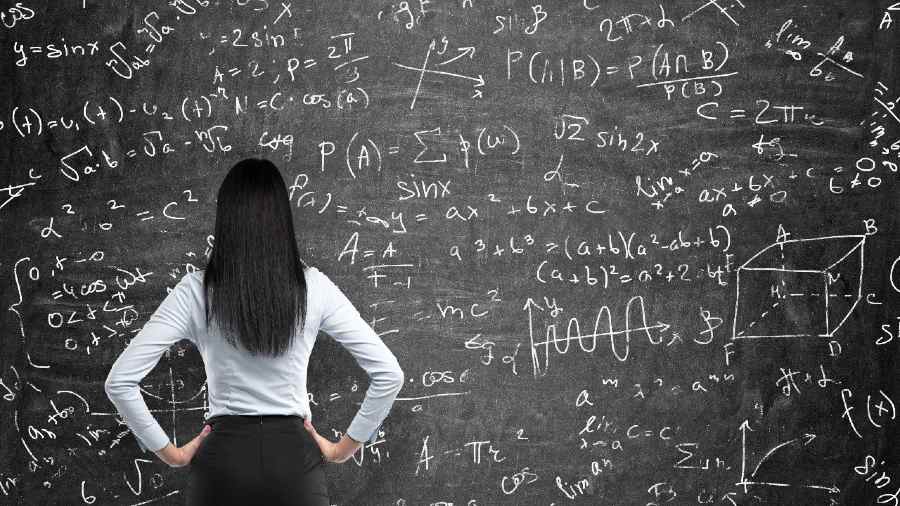The Zariski Cancellation problem is amongst the greatest problems in mathematics. Many eminent mathematicians have tried to solve it without success. A few years ago, a young woman pursuing her PhD at the Indian Statistical Institute (ISI), Calcutta, came across it. Neena Gupta was fascinated by the Zariski problem and had some ideas for it. But when she approached a senior professor who was visiting ISI, he dissuaded her. “He told me it was too difficult, and I should focus on my PhD instead.” Gupta let it go then but returned to it during her doctoral studies at Mumbai’s Tata Institute of Fundamental Research.
She came up with a solution. “Initially, I did not realise it was such a big thing,” she says. But it was indeed and she won several awards and worldwide recognition. In December 2021, she brought home the prestigious Ramanujan Prize for her work in affine algebraic geometry and her solution to the Zariski problem.
Professor Gupta is currently teaching at Calcutta’s ISI. She states that she was not a very high scorer in school mathematics. Then why did she take it up in college? “I just loved to solve maths problems,” says Gupta. She was offered an analytics job but she declined it.
After a degree in mathematics, one can work in academia or be a software developer, programmer, AI engineer or data scientist. Those who have business interests could work as financial analysts, auditors, actuaries or in the emerging fintech industry.
Data science combines domain expertise, mathematics, statistics and programming skills to extract meaningful insights from data. Many large firms such as Google, Amazon, Facebook, Microsoft, Ernst Young, KPMG, Deloitte rely heavily on data analysts and scientists.
The Chennai Mathematics Institute (CMI) offers undergraduate and postgraduate courses in mathematics, physics and computer science. It recently launched a master’s programme in data science. Madhavan Mukund, director of CMI, says, “Students have got very strong placement offers where their level of training in data science and machine learning is being put to good use. They get good salaries too — this year the median salary was about Rs 18 lakh.”
Companies from different sectors have hired students from CMI. Says Mukund, “Temenos, which makes banking software, Micron, a semiconductor company that uses machine learning in their chip design and analytics companies like LatentView have hired our students.” He adds that companies from the finance and investing world also recruit students with good quantitative skills.
Students who major in computer science, physics or economics need to take maths courses. Otherwise, it is not easy to understand essential elements of computer science — algorithms, abstract language, data structures. Kumarjit Saha of Ashoka University, Sonipat, adds, “When students apply for postgraduate courses to schools abroad, they need to show on their transcripts that they have done well in calculus, linear algebra and algebra 1.”
Pritam Chandra, final-year student at Ashoka University, was keen on computer science. But he eventually realised what he liked most was the maths part of it. “So, I decided to major in maths,” says Chandra. He received an offer from Vayana Network, a trade finance company in Bangalore. “I will be doing blockchain coding and maybe some work in data analytics as well in this role.”
Bhavana Timmapuram is a second-year bachelor’s (maths, stats, computer science) student at GITAM University, Visakhapatnam. She says, “I chose this combination because it is important to be thorough in mathematical concepts when coding or working on algorithms. I am very interested in cyber security but I am also exploring a few options in the financial sector.”
Students interested in numbers, statistics and data can pursue actuarial science. Actuaries analyse data to assess and manage risk, making them indispensable to insurance, banking and finance firms. Students need to clear multiple exams set by the Institute of Actuaries of India (IAI) to work in this field.
Pratik H. is an actuarial analyst at Milliman, an actuarial and consulting firm in Gurgaon. He works in the US retirement benefits sector. So far he has cleared seven of the 13 actuarial papers. He says, “You don’t have to clear all the stages initially. After a point, you need to have practical exposure to clear the exams.”
Naina Praveen has an advanced degree in mathematics from Ashoka University. She has been accepted for the master’s at Cambridge, UK. She has also gotten into the ALGANT (algebra, geometry and number theory) master’s programme under Erasmus Mundus. “You get generous scholarships and study at two places from the 10 partnering universities. I got Leiden University in the Netherlands for the first year and Duisburg-Essen in Germany for the second.”
Upon completion, students are awarded a double degree from the two universities. Praveen is keen to teach maths after completing her studies.










